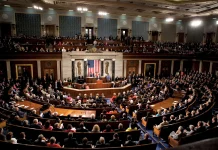Minority Leader of the House of Representatives, Godwin Elumelu, said that the Nigeria movie industry, Nollywood, saw a decline in its contribution to the Gross Domestic Product; from 2.3 percent in 2016 to 0.27 percent in 2019.
He stated this at a Two-Day Leadership Master Training for Nollywood Celebrities and Stakeholders in the Movie Industry held in Abuja.
The House member noted that Nollywood, under the administration of the Peoples Democratic Party (PDP), received “boundless multisectoral support and synergy which resulted in a record productivity boost and unprecedented return to our Gross Domestic Product (GDP).”
He added, “Though there has been a serious decline from the 2.3% GDP contribution recorded in reports released in 2016, to 0.27 in the first quarter of 2019, I believe that with concerted effort and cross-fertilization of idea in training such as this, the industry will surely rebound.
“Furthermore, the movie industry is a critical hub of our national unity. Nigerians are passionate about the movies you produce as it sees their personal and shared challenges, struggles, anxieties, aspirations and achievements in the lives of the characters you aptly portray”.
READ ALSO: Looking To Start An Online Food Business? Here Are Top Ideas
“In the same vein, our movie industry, more than any other social platform, remains critical in the moulding of character and modelling the trajectory of social preferences and predilections, especially among our youths, women and children.
“Moreover, the outside world sees our nation from the plots, setting and narratives of the movies you produce and make decisions one way or the other from what they watch”.
“It is therefore imperative that we deliberately ensure that the movies we produce project our nation in good light. We must strive to use our movies to promote those virtues that stand us out as hardworking and very responsible people which we are, while strategically showing that the vices that threaten our society today are not part of our values as a people.
“Our films must deliberately promote our unity as a people as well as encourage actions that spur mutual understanding, harmonious co-existence and forcefully show our quest for a peaceful society where economic and social activities thrive.
“I know this is a tall order, given the social, religious, political and ethnic-based challenges we face as a nation today. However, with the determination and zeal I see in this hall, I have no doubt in my mind that we will achieve these lofty goals.
“On a personal note, I am particularly pleased that a lot of the recent success of Nollywood has happened in Asaba, Delta State capital, so much so that Asabahas now become the centre of the new Nollywood; a centre of cinematographic innovation in our country today.
“The task before us now is to ensure that the conditions that made Asaba a preferred destination for the film industry are replicated in other parts of the country so that all the many uniquely Nigerian stories can be told in full.
“In both my personal and professional capacities, I have been a friend of the industry for many years. That will not change. I assure you that I will continue to advocate for interventions that aid the growth of the industry so that Nollywood can continue to grow, create employment and wealth for families across the country.”












